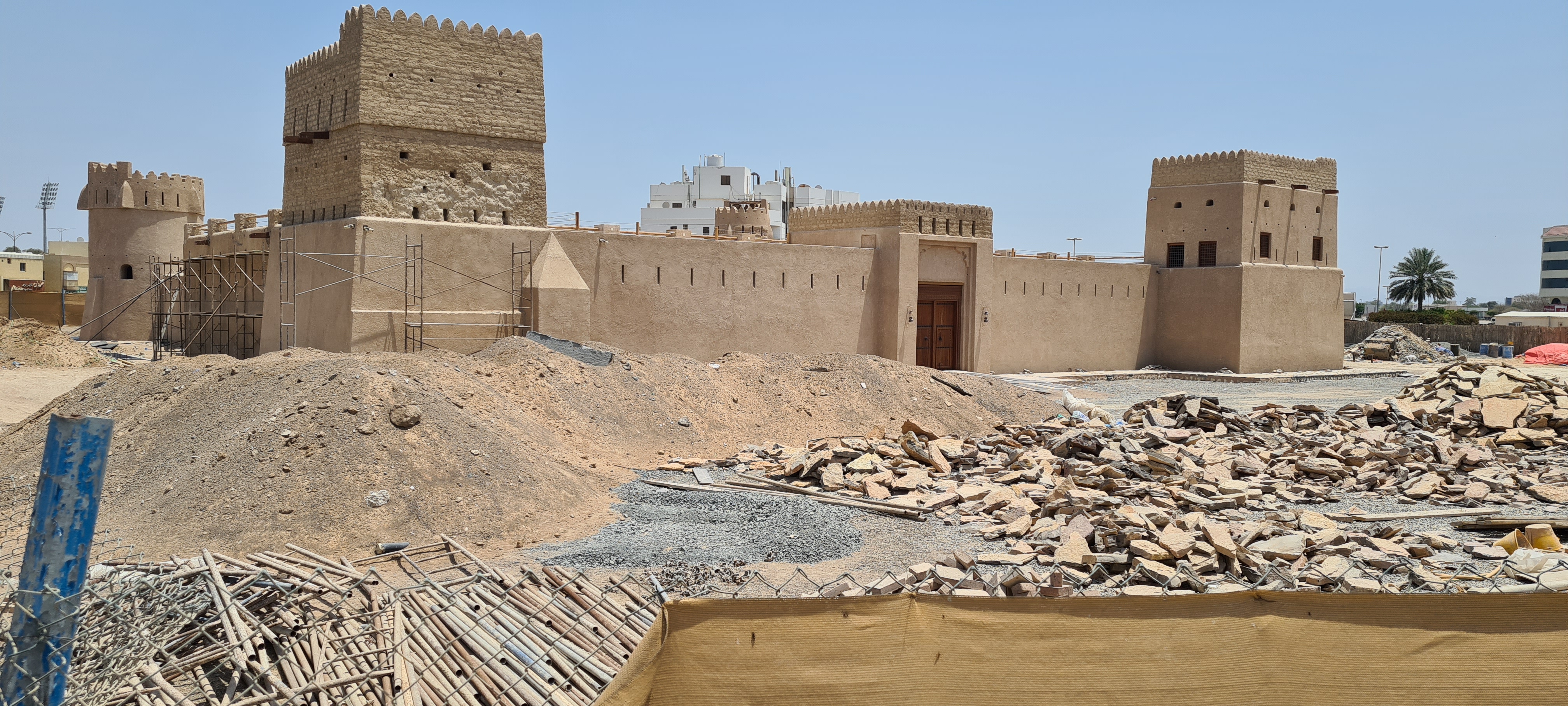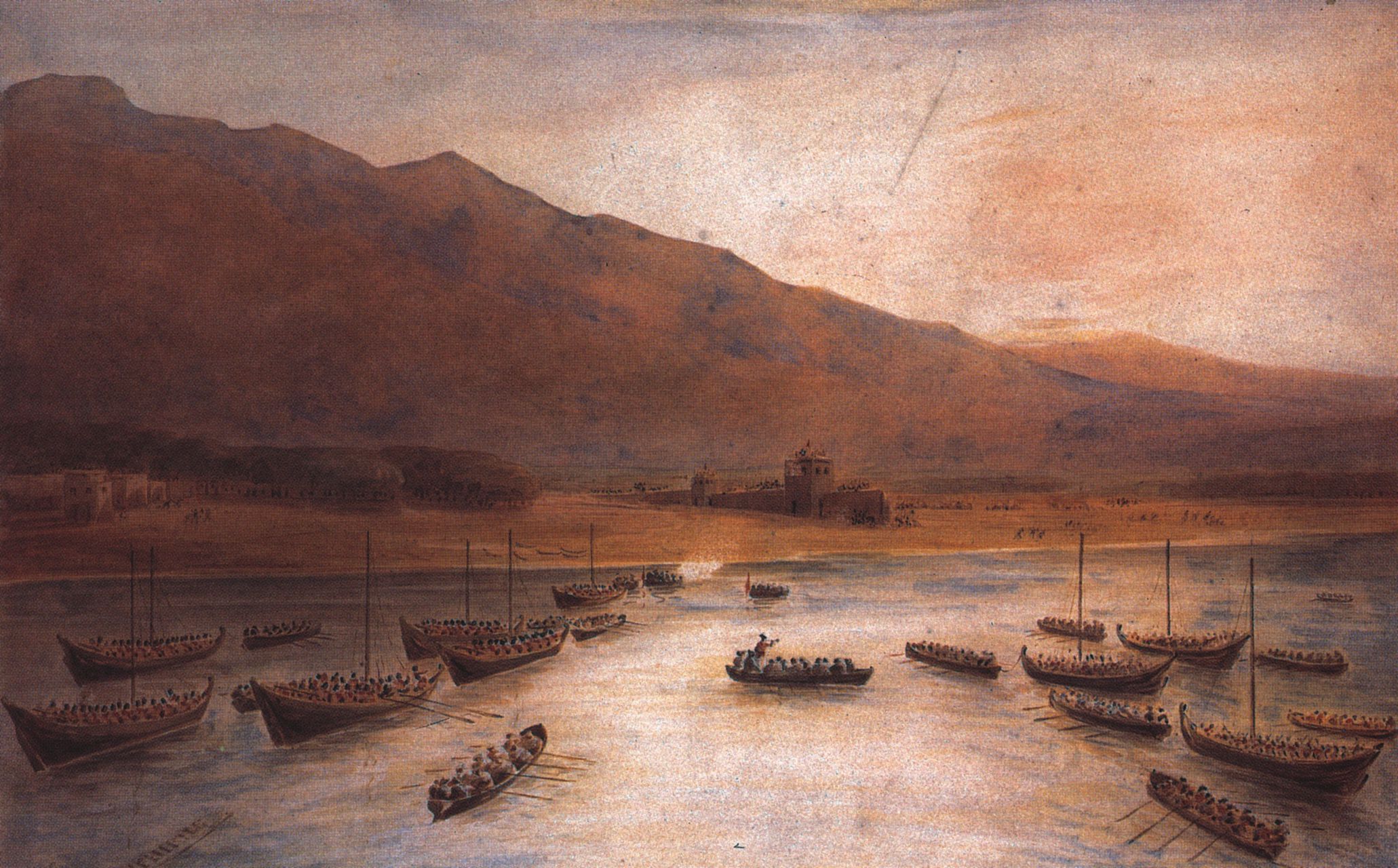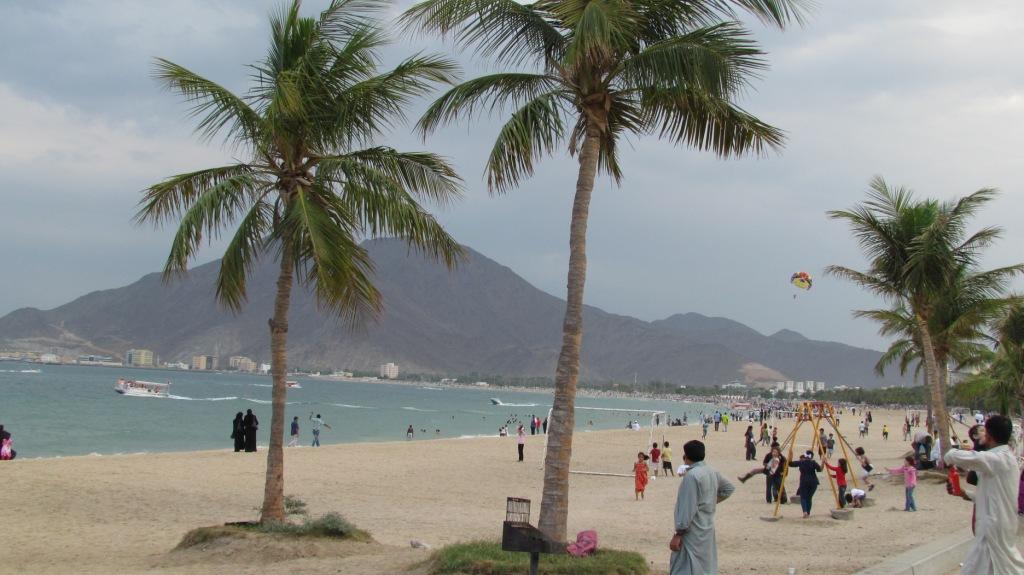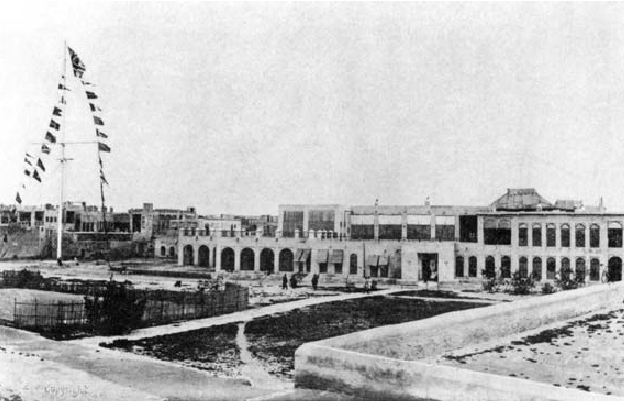|
Hamad Bin Ibrahim Al Mualla
Sheikh Hamad bin Ibrahim Al Mualla was Ruler of Umm Al Quwain from 1923 to 1929, one of the Trucial States which today forms part of the United Arab Emirates (UAE). Accession In October 1923, a slave from Hamad bin Ibrahim's household murdered the-then Ruler of Umm Al Quwain (and Hamad's cousin), Sheikh Abdullah bin Rashid Al Mualla II. Immediately following the funeral, Hamad out-smarted Abdullah's younger brother, Ahmad bin Rashid, and occupied the government house. Hamad managed to balance the ensuing situation and made his peace with Ahmad bin Rashid as well as the families of Umm Al Quwain and, by the time the British Resident visited in March 1924, Hamad was clearly the accepted Ruler of the emirate. Having given sanctuary to the deposed Ruler of Sharjah, Sheikh Khalid bin Ahmad Al Qasimi, Sheikh Hamad managed to avoid a conflict with the Ruler of Sharjah, Sheikh Sultan bin Saqr Al Qasimi, when Khalid bin Ahmad reached a settlement with Sultan which ceded the inland ... [...More Info...] [...Related Items...] OR: [Wikipedia] [Google] [Baidu] |
Al Mualla
The Al Mualla () family is the ruling royal family of Umm Al Quwain, one of the seven emirates that together comprise the United Arab Emirates, United Arab Emirates (UAE). The family was traditionally at the head of the Al-Ali (tribe), Al Ali tribe. The Al Ali (singular, Aliyi), were some 6,750 strong at the turn of the 19th century and were almost all settled either at Umm Al Quwain (1,000 families) or the inland town of Falaj Al Ali (later to be known as Falaj Al-Mu'alla, Falaj Al Mualla). Some 200 settled Al Ali families lived in Sharjah and 150 in Ras Al Khaimah, although there was also a small Bedouin section of some 140 families who roamed a ''dar'' between Al Jazirah Al Hamra, Jazirat Al Hamra and Falaj Al Ali. There was a Persian people, Persian group of Al Ali, who referred to the Umm Al Quwain section as 'Al Mualla'. The tribe originated in Najd, Nejd. Founding Umm Al Quwain The first known head of the Al Ali when they settled at Umm Al Quwain was Rashid bin Majid Al ... [...More Info...] [...Related Items...] OR: [Wikipedia] [Google] [Baidu] |
Khalid Bin Ahmad Al Qasimi
Khalid (variants include Khaled and Kalid; Arabic: خالد) is a popular Arabic male given name meaning "eternal, everlasting, immortal". It also appears as a surname. Behind the Name; accessed February 2016 Notable persons Politics and military * Khalid ibn al-Walid (died 642), Arab military commander in the service of the Rashidun Caliphate *[...More Info...] [...Related Items...] OR: [Wikipedia] [Google] [Baidu] |
Year Of Birth Missing
A year is a unit of time based on how long it takes the Earth to orbit the Sun. In scientific use, the tropical year (approximately 365 solar days, 5 hours, 48 minutes, 45 seconds) and the sidereal year (about 20 minutes longer) are more exact. The modern calendar year, as reckoned according to the Gregorian calendar, approximates the tropical year by using a system of leap years. The term 'year' is also used to indicate other periods of roughly similar duration, such as the lunar year (a roughly 354-day cycle of twelve of the Moon's phasessee lunar calendar), as well as periods loosely associated with the calendar or astronomical year, such as the seasonal year, the fiscal year, the academic year, etc. Due to the Earth's axial tilt, the course of a year sees the passing of the seasons, marked by changes in weather, the hours of daylight, and, consequently, vegetation and soil fertility. In temperate and subpolar regions around the planet, four seasons are ... [...More Info...] [...Related Items...] OR: [Wikipedia] [Google] [Baidu] |
1929 Deaths
This year marked the end of a period known in American history as the Roaring Twenties after the Wall Street Crash of 1929 ushered in a worldwide Great Depression. In the Americas, an agreement was brokered to end the Cristero War, a Catholic Counter-revolutionary, counter-revolution in Mexico. The Judicial Committee of the Privy Council, a British high court, ruled that Canadian women are persons in the ''Edwards v. Canada (Attorney General)'' case. The 1st Academy Awards for film were held in Los Angeles, while the Museum of Modern Art opened in New York City. The Peruvian Air Force was created. In Asia, the Republic of China (1912–1949), Republic of China and the Soviet Union engaged in a Sino-Soviet conflict (1929), minor conflict after the Chinese seized full control of the Manchurian Chinese Eastern Railway, which ended with a resumption of joint administration. In the Soviet Union, General Secretary of the Communist Party of the Soviet Union, General Secretary Joseph S ... [...More Info...] [...Related Items...] OR: [Wikipedia] [Google] [Baidu] |
Ras Al Khaimah
Ras Al Khaimah (; ), often referred to its initials RAK, is the largest city and capital of the Emirate of Ras Al Khaimah in the U.A.E. The city had a population of 191,753 in 2025, and is the sixth-most populous city in UAE after Dubai, Abu Dhabi, Sharjah, Al Ain and Ajman. The city is divided by a creek into two parts: old town in the west and Al Nakheel in the east. The town is the successor to the Islamic era port and trading hub of Julfar. Etymology ''Ras Al Khaimah'' translates to "Headland of the Tent". ''Khaimah'' () means 'Tent', but also refers to the palm frond houses or ''areesh'' that were common in the area. History Antiquity Ras Al Khaimah has been the site of continuous human habitation for 7,000 years, with archaeological finds dating back to the Neolithic. The northern area of the city today known as Ras Al Khaimah was previously the location of the important Islamic era settlement and port of Julfar. Archaeological evidence has demonstrated that Julf ... [...More Info...] [...Related Items...] OR: [Wikipedia] [Google] [Baidu] |
Bani Qitab
The Bani Qitab (Singular ''Al Qetbi'', ) is an Arab tribe of the United Arab Emirates (UAE) and Oman. The singular form of the name, ''Al Ketbi'', is a common family name in the Northern UAE today. Consisting of a settled southern section and a nomadic northern section, the tribe was long influential in the conduct of affairs in the interior of the Trucial States. The Northern branch mostly settled in the inland towns of Dhaid and Al Falayah. Settlement The tribe consisted, at the turn of the 19th century, of some 2,100 nomadic Bedouin (of whom some 600 were fighting men) and 2,700 settled people. The Bedouin ''dar'', or district, of the Bani Qitab stretched from South of the Buraimi oasis to the Eastern foothills of the Hajar Mountains, the Jiri plain to the North of Sharjah and the fertile area around Sharjah's inland oasis town of Dhaid. The Southern Bani Qitab, some 500 households, settled around the village of Aflaj Bani Qitab in the Dhahirah area. Over time these sepa ... [...More Info...] [...Related Items...] OR: [Wikipedia] [Google] [Baidu] |
Bedouin
The Bedouin, Beduin, or Bedu ( ; , singular ) are pastorally nomadic Arab tribes who have historically inhabited the desert regions in the Arabian Peninsula, North Africa, the Levant, and Mesopotamia (Iraq). The Bedouin originated in the Syrian Desert and Arabian Desert but spread across the rest of the Arab world in West Asia and North Africa after the spread of Islam. The English word ''bedouin'' comes from the Arabic ''badawī'', which means "desert-dweller", and is traditionally contrasted with ''ḥāḍir'', the term for sedentary people. Bedouin territory stretches from the vast deserts of North Africa to the rocky ones of the Middle East. They are sometimes traditionally divided into tribes, or clans (known in Arabic as ''ʿašāʾir''; or ''qabāʾil'' ), and historically share a common culture of herding camels, sheep and goats. The vast majority of Bedouins adhere to Islam, although there are some fewer numbers of Christian Bedouins present in the Fertile Cres ... [...More Info...] [...Related Items...] OR: [Wikipedia] [Google] [Baidu] |
Dhaid
Dhaid, or Al Dhaid (), is the capital of the Central Region of the Emirate of Sharjah in the United Arab Emirates. An oasis town, it has extensive irrigated date palm plantations with water channelled from the nearby Hajar mountains, at least in part through ancient tunnels dug for that purpose, known as '' aflāj'' in Arabic (''falaj'' in the singular). Dhaid has long occupied a strategic location in the mouth of the important Wadi Siji. History and prehistory An archaeological site discovered here in 2015 shows evidence of habitation by humans going back hundreds of thousands of years to the Stone Age. In particular, awls for piercing holes in the leather of animal hides, scrapers for cleaning leather, and stone axes were found here. At the turn of the 20th century, Dhaid consisted of some 140 houses, owned by sections of the Tanaij, Bani Qitab and Khawatir tribes, including larger houses with mud brick towers. It also had a four-towered Al-Qasimi fort, featuring two round ... [...More Info...] [...Related Items...] OR: [Wikipedia] [Google] [Baidu] |
Sultan Bin Saqr Al Qasimi
Sheikh Sultan bin Saqr Al Qasimi (1781–1866) was the Sheikh of the Qawasim and ruled the towns of Sharjah, Ras Al Khaimah, Jazirah Al Hamra and Rams; all within the then Trucial States and now part of the United Arab Emirates. Briefly a dependent of the first Saudi Kingdom, his rule over Ras Al Khaimah ran from 1803–1809, when he was deposed by order of the Saudi Amir and restored in 1820, going on to rule until his death in 1866 at the age of 85. He was Ruler of Sharjah from 1814–1866, with a brief disruption to that rule in 1840 by his elder son Saqr. He was a signatory to various treaties with the British, starting with the General Maritime Treaty of 1820 and culminating in the Perpetual Maritime Truce of 1853. Rule A characteristic of Sultan's rule is that he placed relatives as '' walis'' or headmen of the emirates under his rule and so Ras Al Khaimah was effectively ruled by Mohammed bin Saqr, Sultan's brother, from 1823 until his death in 1845, while anothe ... [...More Info...] [...Related Items...] OR: [Wikipedia] [Google] [Baidu] |
Emirate Of Sharjah
The Emirate of Sharjah (; ') is one of the emirates of the United Arab Emirates, which covers and has a population of over 1,400,000 (2015). It comprises the capital city of Sharjah, after which it is named, and other minor towns and exclaves such as Kalba, Al Dhaid, Dibba Al-Hisn and Khor Fakkan. The emirate is an absolute monarchy. It has been ruled by Sultan bin Muhammad Al-Qasimi since 1972, except for a seven-day period during an attempted coup d'etat by his brother, Sheikh Abd al-Aziz bin Muhammad Al Qasimi. History Human settlement in the area covered by the emirate has existed for over 120,000 years, with significant finds made of early axes and stone tools as well as Copper and Iron Age implements in Al Dhaid, Al Thuqeibah, Mileiha, Tell Abraq, Muwailah, Al Madam and Jebel Faya. Archaeological finds in the Mleiha area point to human habitation consistent with the spread of humanity from Africa to the wider world, evidenced by finds displayed at the Ml ... [...More Info...] [...Related Items...] OR: [Wikipedia] [Google] [Baidu] |
Sheikh
Sheikh ( , , , , ''shuyūkh'' ) is an honorific title in the Arabic language, literally meaning "elder (administrative title), elder". It commonly designates a tribal chief or a Muslim ulama, scholar. Though this title generally refers to men, there are also a small number of female sheikhs in history. The title ''Syeikha'' or ''Sheikha'' generally refers to women. In some countries, it is given as a surname to those of great knowledge in religious affairs, by a prestigious religious leader from a silsila, chain of Sufi scholars. The word is mentioned in the Qur'an in three places: verse 72 of Hud (surah), Hud, 78 of Yusuf (surah), Yusuf, and 23 of al-Qasas. A royal family member of the United Arab Emirates and some other Arab countries, also has this title, since the ruler of each emirate is also the sheikh of their tribe. Etymology and meaning The word in Arabic stems from a Semitic root, triliteral root connected with aging: , ''shīn-yā'-khā. The title carries the me ... [...More Info...] [...Related Items...] OR: [Wikipedia] [Google] [Baidu] |
Persian Gulf Residency
The Persian Gulf Residency () was a subdivision of the British Empire from 1822 until 1971, whereby the United Kingdom maintained varying degrees of political and economic control over several states in the Persian Gulf, including what is today known as the United Arab Emirates (formerly called the "Trucial States") and at various times southern portions of Iran, Bahrain, Kuwait, Oman, and Qatar. Historical background until 1900 British interest in the Persian Gulf originated in the sixteenth century and steadily increased as British India's importance rose in the Empire, imperial system of the eighteenth and nineteenth centuries. In the beginning, the agenda was primarily commercial. Realizing the region's significance, the English fleet supported the Persian emperor Abbas the Great, Abbas I in Anglo-Persian capture of Hormuz, expelling the Portuguese from Hormuz Island in 1622. In return, the East India Company was permitted to establish a trading post in the coastal city of ... [...More Info...] [...Related Items...] OR: [Wikipedia] [Google] [Baidu] |








